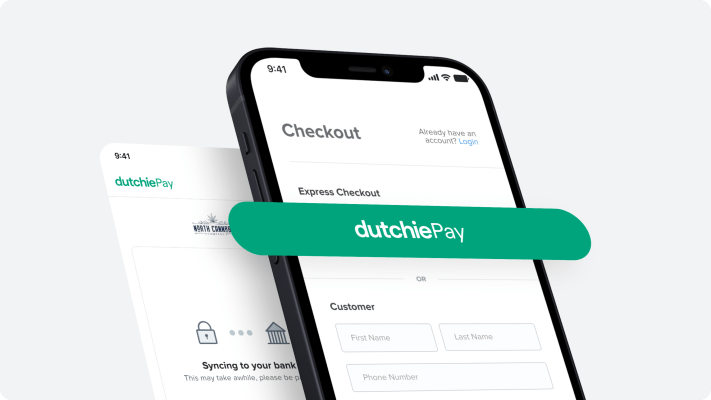Cannabis is now legal in a number of U.S. states, but because it isn’t federally legal, this “legal” status only does so much for cannabis businesses. While dispensaries can sell cannabis products legally in many states, they don’t have access to the same banking facilities that any other retail business would.
As a technology platform for cannabis commerce, Oregon-based startup Dutchie is cognizant of the complexity of the problem it is trying to tackle. “We are frankly a little bit and kind of in the stone age when it comes to payments and cannabis,” co-founder and chief product officer Zach Lipson told TechCrunch.
“It really forces the industry to rely on cash,” he said, pointing out that 90% of all dispensary transactions are handled in cash. This figure might be a tad high or slightly outdated, as it comes from a 2020 report by research firm Aite Group, prepared for Emerging Markets Coalition (EMC), an advocacy group for financial services in the cannabis space. But the point remains: Cashless transactions are often not an option for cannabis businesses.
Zach and his co-founder (who is also his brother and the company’s CEO), Ross Lipson, aim to solve that problem with Dutchie Pay, a payment solution that is designed for the legal cannabis market in the U.S.
How it works
If you’re buying legal cannabis for medical or recreational purposes, you might be able to place an order on your dispensary’s website, but you’ll still have to pay cash upon delivery or pickup. This is where Dutchie Pay comes in.
Dutchie Pay’s moniker is reminiscent of Apple Pay, and that’s not a coincidence — Dutchie also has ambitions to be a one-click payment system.
But because it’s in the cannabis space, there are a few differences. For starters, rather than using debit or credit cards, Dutchie Pay relies on ACH bank transfers, a bank-to-bank payment system that is fairly popular in the U.S. Once it is set up, though, it works similar to its mainstream peers.
Dutchie’s solution works well for repeat purchases, Zach said. “It feels just like it does when customers are using credit cards and other systems. The payment information is stored; you don’t have to think about it,” he said.
Dutchie Pay is e-commerce-only for now, but the company plans to let you make purchases in-store by the fall.
Reducing the cost of cash
“Providing modern payment solutions,” Dutchie argued in a release, “is essential for the industry to better compete with the illicit market.”
But why would payments have anything to do with competing with the cannabis black market? Dutchie argues that the lack of frictionless payments is partly a barrier to normalizing the cannabis shopping experience, and because it burdens dispensaries with what is known as “the cost of cash,” which is both direct and indirect.
Having to handle large amounts of cash, Zach said, “introduces a lot of liability and the potential for theft and robbery. It also increases costs for dispensaries, which already have a really slim margin because of other regulatory constraints that they have to deal with.”
The startup hopes Dutchie Pay will help decrease these costs. It seems to have been a little successful, too: after eight months of alpha and beta testing, the company apparently found that it had managed to reduce customers’ cash management costs by about 15%.
The startup also found out that there’s value in making online purchases more convenient for customers.
One of the platform’s early testers, Joshua Kahn, who owns the Takoma Wellness Center dispensary in Washington, D.C, said Dutchie Pay has improved customers’ overall shopping experience while resulting in higher basket sizes and customer loyalty.
On average, Dutchie claims, its customers’ order values have increased by 30%, while abandoned cart rates have declined by 32%.
There’s also value, Kahn added, in having a solution that is “fully integrated with e-commerce and point of sale.”
“It just simply says on the screen on their cash register that it was already paid for with Dutchie Pay, and the customer can go,” Zach said.
Access to cannabis
Dutchie Pay is now available to customers across the United States, but it first found its feet as part of a wider R&D effort to which Dutchie has made a significant $100 million commitment.
This R&D expense is funded by some of the $350 million the company raised in its Series D round last year, CEO Ross Lipson told TechCrunch at the time. Led by D1 Capital Partners, the round valued Dutchie at $3.75 billion and brought its total funding to more than $600 million.
All that cash will be handy, because there are plenty of problems to solve. “These are customers that have difficult businesses to run,” Zach said, speaking about dispensaries. “There’s a lot that we can do to make those businesses more efficient and make it easier for them to serve their customers.”
Investors investing in cannabis-related startups in North America are taking a similar view and hope that the plant and its derivatives will eventually be federally legal. “Morally and ethically, I take tremendous issue with cannabis’ current status as a Schedule I substance and its effect on communities from a criminal justice perspective,” Poseidon Investment Management managing director told TechCrunch in a recent investor survey.
But when cannabis is made federally legal, dispensaries will also have access to PayPal, Apple Pay and the like, which may wash the color out of Dutchie’s unique selling proposition. But Zach isn’t concerned about what this might mean for Dutchie Pay, saying it could adapt to additional payment methods.
As with all things related to cannabis in the U.S., when that will happen remains an open question. Here at TechCrunch, we plan to keep an eye out to see if alongside mainstream VCs, payments companies start questioning their policy of staying away from this space.
